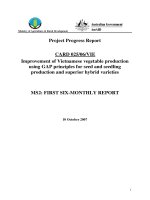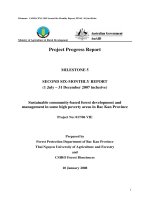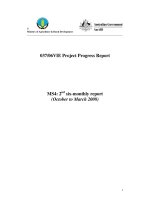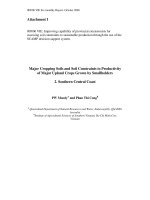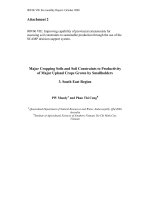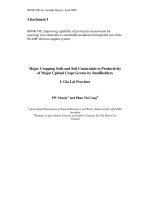Dự án nông nghiệp " Replacing fertiliser N with rhizobial inoculants for legumes in Vietnam for greater farm profitability and environmental benefits " MS2 doc
Bạn đang xem bản rút gọn của tài liệu. Xem và tải ngay bản đầy đủ của tài liệu tại đây (238.34 KB, 17 trang )
Ministry of Agriculture & Rural Development
Project Inception Report
013/06VIE
Replacing fertiliser N with rhizobial inoculants for
legumes in Vietnam for greater farm profitability and
environmental benefits
MS2: FIRST SIX-MONTHLY REPORT
24
th
September 2007
1
Table of Contents
1. Institute Information ___________________________________________________ 2
2. Project Abstract _______________________________________________________ 4
3. Executive Summary ____________________________________________________ 4
4. Introduction & Background _____________________________________________ 4
5. Progress to Date_______________________________________________________ 6
5.1 Implementation Highlights________________________________________________ 8
5.2 Smallholder Benefits _____________________________________________________ 9
5.3 Capacity Building _______________________________________________________ 9
5.4 Publicity _______________________________________________________________ 9
5.5 Project Management _____________________________________________________ 9
6. Report on Cross-Cutting Issues___________________________________________ 9
6.1 Environment ___________________________________________________________ 9
6.2 Gender and Social Issues _________________________________________________ 9
7. Implementation & Sustainability Issues ____________________________________ 7
7.1 Issues and Constraints____________________________________________________ 7
7.2 Options ________________________________________________________________ 7
7.3 Sustainability __________________________________________________________ 10
8. Next Critical Steps ____________________________________________________ 10
9. Conclusion __________________________________________________________ 10
10. Statuatory Declaration__________________________Error! Bookmark not defined.
1
1. Institute Information
Project Name
Replacing fertiliser N with rhizobial inoculants for
legumes in Vietnam for greater farm profitability
and environmental benefits
Vietnamese Institution
Oil Plants Institute (OPI)
Vietnamese Project Team Leader
Ms Tran Yen Thao
Australian Organisation
NSW Department of Primary Industries
University of Sydney
Australian Personnel
Dr David Herridge
Dr Roz Deaker
Ms Elizabeth Hartley
Mr Greg Gemell
Date commenced
March 2007
Completion date (original)
March 2009
Completion date (revised)
As above
Reporting period
March – September 2007
Contact Officer(s)
In Australia: Team Leader
Name:
Dr David Herridge
Telephone:
02 67631143
Position:
Principal Research
Scientist
Fax:
02 67631222
Organisation
NSW Department of
Primary Industries
Email:
In Australia: Administrative contact
Name:
Mr Graham Denney
Telephone:
02 63913219
Position:
Manager External
Funding
Fax:
02 63913327
Organisation
NSW Department of
Primary Industries
Email:
In Vietnam
Name:
Ms Tran Yen Thao
Telephone:
08 9143024 -
8297336
Position:
Researcher
Fax:
08 8243528
Organisation
Oil Plants Institute (OPI)
Email:
2
3
2. Project Abstract
Farmers in Vietnam currently fertilise legumes such as soybean and groundnut with N,
rather than inoculate with rhizobia. Replacing fertiliser N with rhizobial inoculants
would save Vietnamese farmers A$50-60 million annually in input costs and, at the same
time, help facilitate the desired expansion in legume production. There would also be
positive environmental outcomes. This project aims to increase production of high-
quality legume inoculants in Vietnam through enhanced production capacity,
implementation of a national quality assurance (QA) program at and increased inoculant
R&D. Participating in the project in Vietnam are the Oil Plants Institute (OPI), the
Institute of Agricultural Science (IAS) and the National Institute for Soils and Fertilisers
(NISF). Institutions in Australia are NSW Department of Primary Industries and the
University of Sydney. Legume inoculant use by farmers in Vietnam will be increased
through the development and implementation of an effective extension and training
program for researchers, MARD extension officers and farmers. The benefits of
inoculants and legume nitrogen fixation will be demonstrated in the field and
communicated through workshops, meetings and publications. To ensure sustainability
of inoculant production and use, the project will engage the private sector in marketing
and ‘pilot production’ of legume inoculants, with the aim that they may scale-up
production and progressively take over supply as the technology and markets are
developed.
3. Executive Summary
The project commenced in February/March 2007 with a 2-week Legume Inoculant
Quality Assurance (QA) workshop at the Institute of Agricultural Science (IAS)
laboratories in HCM City and a 2-day Project Inception workshop at the Oil Plants
Institute (OPI), also in HCM City.
QA Workshop, IAS, HCM City
The workshop (26 Feb – 9 March, 2007) aims were to provide the Vietnamese scientists
and technicians with an overview of the requirements and protocols for quality control of
legume inoculants, and to improve their skills in order that legume inoculants in Vietnam
copuld be routinely measured for quality. It was expected that understanding the
parameters of quality would improve inoculant production techniques and increase
availability and adoption of high quality legume inoculants in Vietnam. The protocols
presented were based on the quality control program used by the NSW Department of
Primary Industries - Australian Legume Inoculant Research Unit (ALIRU) in Australia.
The workshop was divided into two components. Firstly, participants gained practical
experience in quality control protocols and secondly, quality control procedures were
discussed and adapted to suit local conditions in Vietnam.
Lists of workshop personnel and the 17 participants are provided in Appendix 1. The
workshop was designed by ALIRU staff and presented by Elizabeth Hartley (ALIRU),
Greg Gemell (ALIRU) and Rosalind Deaker (University of Sydney). Each participant
was provided with a workbook and comprehensive notes on procedures:
4
Workbook: Quality Control of Legume Inoculants Workshop, 26
th
February – 9
th
March
2007, compiled by E. Hartley, G. Gemell, J. Hartley (01/02/2007). 37 pages.
Procedures Section: Quality Control of Legume Inoculants Workshop, compiled by E.
Hartley, G. Gemell, J. Hartley (01/02/2007). 32 pages.
Organisation of the workshop and selection of the participants was facilitated by the
Vietnamese project leader Tran Yen Thao. Workshop participants were selected to
represent all institutes and private-sector inoculant manufacturers/distributors involved in
project 013/06VIE. All participants were skilled in general microbiological procedures.
Project Inception Workshop, OPI, HCM City
Present at the Inception Workshop at OPI were personnel from OPI, Cantho University
(CTU), Institute of Agricultural Science (IAS), Soils and Fertilizers Institute (SFI),
Ministry of Industry (MOI), and the National Agricultural Extension Centre (NAEC).
There were also representitives from the three private sector companies - Fitohoocmon,
Humix and Cu Chi - that are interested in being involved in inoculant
production/distribution in Vietnam. The major outcome of the Workshop and subsequent
discussions was a clear framework of timelines, R&D plans and budgets for activities in
Vietnam, Australia and Thailand during the course of the 2-year project. Three copies of
the signed agreement between the Oil Plants Institute, the project’s lead agency in
Vietnam, and NSW DPI were brought back to Australia.
Inoculant Production Workshop, Suranaree University, Thailand
The aim of this training workshop (4–22 June 2007) was to improve the skills of
Vietnamese scientists in order to improve inoculant production techniques in Vietnam. It
was expected that the practical and theoretical nature of the training would mean rapid
application of the technologies in Vietnam. Activities focussed on lectures, laboratory
training and visits to production facilities in Thailand. The training covered background
information on rhizobia, fermentation technologies including large systems and the micro
production unit (MPU), carbon source for rhizobia in fermentation, other plant growth
promoting (PGP) organisms and counting techniques (see Appendix 2 for details).
Three Vietnamese scientists participated in the training:
- Tran Minh Hien, researcher from IAS (HCM City), the main person responsible for
research and production of rhizobial inoculants at IAS.
- Le Thi Thanh Thuy, researcher at the National Institute for Soils and Fertilizers (NISF)
in Hanoi.
- Ms. Tran Yen Thao, researcher at OPI (HCM City), leader of biological nitrogen
fixation research group at OPI and 013/06VIE project leader.
R&D and Extension Programs
The R&D programs commenced in April 2007 with trials sown in the northern upland
(Son La province) and in August 2007 in the Central Upland (Dak Nong and Dak Lak
provinces). In Son La province, three filed trials of soybean were conducted. There are
responses to inoculation. Fields were harvested and data analysis is in progress. Samples
of biomass and seed are being prepared for N analysis. In Dak Nong and Dak Lak, three
trials of soybean and three trials of groundnut were sown in August. Plants are growing
well now and preparing for the nodules harvest. There are two field experiments of
inoculation for vegetable soybean at Dak Lak.
The extension program commenced in April 2007 with trials sown in the northern upland
(Son La province) and in August Central Upland (Dak Nong and Dak Lak province). In
5
Son La, demonstrations were conducted at 3 sites. Farmers, extension officers and
officers of provincial governments were invited. Generally, they were interested in
inoculation and hope to have the products soon for application. In Dak Nong and Dak
Lak, demonstrations were conducted at 6 sites, 3 for groundnut and 3 for soybean.
Farmers and extension officers were invited to the demonstration sites at sowing to get to
know about inoculant products, how to mix inoculants with seeds and how to sow.
Farmers were very curious about inoculants. They will be invited to the fields when
nodules are harvested.
Surveys were conducted during April – August to determine the level of knowledge by
farmers and advisers about inoculants, inoculant use by farmers and their attitudes to
inoculant use in the future, and, finally, current production and QA of inoculants in
Vietnam. Results are being compiled for reporting in October 2007.
4. Introduction & Background
Project Objectives and Expected Outputs
The Vietnamese government (MOI, MARD) is committed to increase the area sown to
legumes from the current 780,000 ha to >1,000,000 ha by 2010, with particular focus on
soybean and groundnut in the Mekong Delta, the Central Coastal region and upland
(highland) areas of the North, Central and North. The legumes are used for production of
food, oil and protein meal, and are grown as rotation crops with rice (Mekong Delta), as
intercrops in the upland areas with cassava, sugar cane, rubber, fruit and maize and as
cover crops in the sandy coastal soils. ACIAR Small Project LWR2/98/27 (Increasing
yield and nitrogen fixation of soybeans, groundnuts and mungbean in Vietnam through
Rhizobium inoculation) identified that legume production in Vietnam currently relies on
expensive imported fertiliser N, rather than cost-effective inoculants containing rhizobia.
Replacing fertiliser N with rhizobial inoculants would save Vietnamese farmers A$50-60
million annually in input costs and, at the same time, help facilitate the desired expansion
in legume production. There would also be positive environmental outcomes.
Details of the economic benefits of replacing fertiliser N with rhizobial inoculation were
outlined in the proceedings of the technical workshop to terminate LWR2/98/27.
However, for this to happen, high-quality inoculants need to be readily available in the
market. The current capacity of inoculant production in Vietnam is about 40,000 packets
annually, and would need to be increased to about 500,000 packets annually to meet
potential demand. Inoculant quality is also poor (LWR2/98/27 project) and would need to
be improved. Shelf life and distribution and marketing are issues that would also need to
be addressed. Moreover, there is limited awareness of the benefits of inoculants and
methods of application among Vietnamese farmers and extension workers.
Capacity gaps are evident at the national and institutional level. The major gap at the
national level is the lack of a coordinated, focussed national legume inoculant program.
At the institutional level, the gaps are capacity for medium-scale inoculant production and
associated quality assurance (QA) as well as R&D and training capacity. The proposed
project would address these issues of production, quality, distribution and marketing and
farmer education. Involvement of the private sector in both production and marketing will
ensure the long-term viability of the concept. The project objectives are to:
6
1. Increase production of high-quality inoculants for soybean, groundnut and other
legumes in Vietnam through enhancement of production capacity (personnel and
equipment) at participating institutions, implementation of QA, and increased
inoculant R&D;
2. Increase farmer interest and use of inoculants in Vietnam through development
and implementation of an effective extension and training program on inoculants
and legume nitrogen fixation for researchers, MARD extension officers and
farmers through demonstration trials, workshops and meetings, and publications;
3. Ensure the long-term viability of the project through involvement of the private
sector in this ‘pilot production’ of legume inoculants, with the aim that the private
sector would progressively take over production as the technology and markets
are developed.
The Project is aligned with the CARD Program Strategic Objective 2 ‘Improved
productivity and links to markets for the rural poor in the Mekong Delta and Central
Coast regions’, through Objective 2.1 ‘Increase rural productivity’, using principally
Strategy 1 ‘Increase productivity and competitiveness of the agricultural system’.
Project Approach and Methodology
The project strategy is to enhance inoculant production, quality, distribution and
marketing and farmer education through the collaborating institutions. It will involve
both Government institutions – Oil Plants Institute (OPI), the Institute of Agricultural
Science (IAS) and the Institute for Soils and Fertilisers (ISF) – as well as private sector
companies (Fitohoocmon Fertiliser JSC, Cu Chi Bio-Chemical Fertiliser JSC and
Humix). The latter would be involved initially in marketing and distribution of inoculants
and would be provided with advice and technical expertise to improve and expand their
inoculant production capabilities. In time, it is envisaged that the private sector would
take over inoculant production, leaving QA to the public institutions. Involvement of the
private sector in both production and marketing will ensure the long-term viability of the
concept.
Increased production of high-quality inoculants and QA
The focus will be on rhizobial strains and their maintenance, inoculant production
(fermentation) technologies, quality assurance of the production process and products and
training in the production technologies and QA.
Rhizobial strains - Existing strains from the collections in Vietnam and/or other
institutions, eg. ALIRU (Australia), NifTAL (University of Hawaii), Suranaree
University (Thailand) will be utilised where appropriate. Decisions will be made about
the most appropriate strains for inoculant production through a program of research and
development.
Strain maintenance - Protocols and operation manuals for maintaining strain
effectiveness and recognition to ensure stability of inoculant quality during long-term
storage will be developed and implemented. During the course of the project a decision
will be made about which institute/s will take responsibility for the maintenance of a
culture collection and verification of strains for inoculant production. The institute/s will
be equipped with the necessary materials to continue processing germplasm for inoculant
production.
Production technology
– Draw on experiences from Thailand and Australia to develop
production technology of inoculants at medium-scale in Vietnamese institutes through:
7
• Modifications to broth formulations and experiments in procedures for maintaining
sterility and dispensing broths into the inoculant carrier.
• Testing appropriate forms of inoculant (peat, granular, liquid) that allow compliance
with quality control standards and are easy to use, supply and transport. Economic
benefits will be determined by assessing their effectiveness in laboratory and field trials.
• Strain selection: Different strains will be tested for survival in inoculant products and
during delivery of products to the field.
Quality assurance - Australian QA protocols will be used initially as a model. From that,
QA protocols, training and working manuals specific to inoculant production in Vietnam
will be developed jointly between Australian and Vietnamese project scientists.
Decisions will be made about which institute will be equipped to carry out on-going
routine quality control of inoculants in Vietnam.
Training on inoculant production and QA - Vietnamese researchers from institutes will
be trained in Vietnam by Australian collaborators and at Suranaree University of
Technology (Thailand) in inoculant production, QA and laboratory management, as well
as R&D in rhizobiology.
Extension and training of farmers and advisers
The extension-training program for farmers and extension officers will be built around
simple, multi-location inoculation experiments in the legume production areas (Mekong
Delta, the Central Coastal region and upland (highland) areas of the North and Central
and the South East). They will involve participation of farmers and extension officers in
all aspects, from the design of experiments to sowing, sampling, harvesting and
interpretation of results. It is expected that the MARD extension service will play a large
role in extension activities. Data from field demonstrations will be used to produce an
economic model for production and use of legume inoculants in Vietnam. In addition,
training courses will be organised for farmers, extension workers and researchers in
methods of inoculant use, and economic as well as environmental benefits of inoculation.
This extension-training program will be conducted by Vietnamese researchers in
collaboration with Australian counterparts, who will assist in collating and preparing
extension materials for translation and transfer to Vietnam.
Involvement of the private sector in production, distribution and marketing
Two (and possibly three) Vietnamese companies will be involved in the project,
Fitohoocmon Fertiliser JSC and Cu Chi Bio-Chemical Fertiliser JSC (and Humix). It is
envisaged that the market for inoculants will grow during the course of the project from
the current low level and that the private sector will progressively become involved as the
production technology is developed and the market for the inoculants expands. The
companies will initially be involved in marketing and inoculant distribution. Training
workshops will also be open to researchers from the collaborating private companies.
Project scientists will provide technical expertise to the companies throughout the project
to troubleshoot production problems and increase production capacity and product
quality.
5. Progress to Date
Implementation Highlights
Implementation highlights include the successful completion of the QA Workshop in
HCM City in February–March 2007, the successful Project Inception Workshop, also in
8
HCM City in February–March 2007, the successful completion of the Inoculant
Production Technologies Workshop in Thailand in June 2007 and the commencement of
project activities in laboratory and field during April – September 2007 (see Progress
Report Logframe for details).
Smallholder Benefits
Potential benefits for smallholders are valued at A$50–60 million p.a., principally through
reduced use of fertiliser N. Benefits for the smallholders should start to flow through after
the second year of the project.
Capacity Building
Capacity building has commenced with participation of 17 Vietnamese
scientists/technicians at the QA Workshop in HCM City in February–March, the
Inoculant Production Technologies Workshop in Thailand in June 2007, and the purchase
of materials and equipment for R&D and inoculant production.
Publicity
None at this stage.
Project Management
The project is progressing smoothly, although Can Tho University, originally identified in
the project as a collaborator, pulled out immediately following the Inception Workshop
and QA training in HCM City. Its place in the project has been taken by
the Institute of
Agriculture and Forestry for Tay Nguyen (IAF) and the Agricultural Science Institute for
Southern Coastal Centre of Vietnam (ASISCV).
6. Report on Cross-Cutting Issues
Environment
The project is expected to have a positive impact on the environment through increased
productivity of the legumes and the substitution of industrially produced fertiliser N with
biologically fixed N. The extension program will increase general knowledge of soils and
fertility management, thereby improving soil management. Reduced use of fertiliser N,
particularly in the rice cropping systems of the Mekong Delta, will have benefits for
water quality and production of paddy fish and shrimp. We also expect that soil
degradation in the upland areas will be reduced with the increased productivity through
the legume cropping.
Gender and Social Issues
Gender are expected to be neutral. Social issues are expected to be positive as the positive
economic impact of the project begins to flow through.
7. Implementation & Sustainability Issues
Issues and Constraints
There were some issues regarding collaborating institutions in Vietnam, which were
resolved immediately after the Inception Workshop. Briefly, Cantho University withdrew
from the project and its responsibilities are to be covered by
the Institute of Agriculture
9
and Forestry for Tay Nguyen (IAF) and the Agricultural Science Institute for Southern
Coastal Centre of Vietnam (ASISCV).
Options
As stated above,
Sustainability
At this stage, the project is sustainable.
8. Next Critical Steps
Steps to be taken during the next 6 months:
• Compile results of the surveys on inoculants in Vietnam for October 2007
reporting
• Continue field experimental program in the north, central, and south of Vietnam
and Mekong Delta areas
• Commence application of new production technologies for rhizobial inoculants
and QA protocols in the major project laboratories in Vietnam – OPI, IAS and
NISF
• Commence R&D program on issues relevant to inoculant production in Vietnam,
eg strain evaluation, inoculant formulations and packaging etc.
• Continue to upgrade laboratory and plant growth facilities in the major project
laboratories in Vietnam (OPI, IAS and NISF) through equipment and
consumables purchase
• Plan and implement early 2008 training program for inoculant technology at
Suranaree University, Thailand
• Commence development of extension and training workshop materials and
programs
• Continue to work with the 3 private sector companies (Fitohoocmon, Humix and
Cu Chi) regarding extension, education and training and marketing of inoculants
9. Conclusion
At this stage, the project is on target to meet its objectives.
10
11
Project Progress Against Proposed Objectives, Outputs, Activities And
Inputs
Project Title: Replacing fertiliser N with rhizobial inoculants for legumes in Vietnam for greater farm profitabil
i
Vietnamese Implementing Institution: Oil Plants Institute (OPI)
PROPOSAL
Narrative Details of Objectives, Outputs and
Activities
Performance Measures Assumptions
OBJECTIVES
1. Increase production of high-quality
inoculants in Vietnam through
enhancement of production capacity,
implementation of QA and inoculant
R&D.
Increased production and use of
high quality inoculant
- High capacity for
production of high quality
inoculants
- Widespread effectiveness
of inoculation
- Farmer interest
- Continuity of funds and
skilled personnel for
rhizobiology program
Remains
r
2. Develop and implement an
effective extension and training
program on inoculants and legume
nitrogen fixation for researchers,
extension officers and farmers.
Increased awareness of
effectiveness and availability of
legume inoculants
- Through effective
extension and training
programs, farmers’
awareness of inoculants,
legume N fixation, and the
environmental and economic
benefits of legumes will be
enhanced and inoculant use
increased.
Remains
r
3. Involvement of the private sector in
inoculant production and marketing
for long-term project viability.
Use of private sector’s
distribution networks to market
and distribute legume inoculants.
High volume production of
inoculants by private sector.
- Involvement of the private
sector will ensure long-term
viability of inoculant
production in Vietnam.
Remains
r
OUTPUTS
1.1. Highly effective rhizobial strains
identified for inoculant production.
Selection of effective strain/s for
inoculant production in Vietnam.
Assuming strain
effectiveness common
across country/regions/soil
type
1.2. Appropriate protocols for
maintaining stability of inoculant
strains and quality of inoculants in
medium and large-scale production
systems.
Researchers and laboratories
equipped for verifying and
maintaining strains and
measuring quality of inoculant
products.
QA protocols and standards
used in Australia may need
to be modified to suit
Vietnamese conditions
1.3. Production and distribution of
high-quality inoculants in Vietnam.
Researchers and laboratories at
ISF and CTU equipped for the
production of high quality
inoculants in quantities sufficient
to conduct large scale field trials
and low farmer demand
Assuming capacity can be
developed for large volumes
and increase quality and
effect distribution to farmers
in timeframe of project
2.1. Field demonstrations in
conjunction with farmer field days and
workshops on inoculant use,
assessment of effectiveness of
inoculation, the benefits of
inoculation.
Use of demonstration fields and
workshops in project target areas
to educate farmers and
extension workers on use and
effectiveness of inoculants.
Field plots effectively
demonstrate benefits of
inoculation. Interest by
extension workers and
farmers in inoculation
technology.
2.2. Extension material on methods of
inoculant use, effects of inoculation
on productivity, profitability and
benefits to environment written,
Accessibility of information on
the methods and benefits of
legume inoculation by extension
workers and farmers
Extension material is
relevant to target audience.
12
published and distributed to farmers,
extension workers and researchers.
3.1. Initial involvement of private
sector in marketing and distribution of
inoculants.
Information on benefits, use and
availability of inoculants widely
available
Market is sufficiently large
and manageable to interest
private sector.
3.2. Progressively increased
involvement in production of
inoculants as technologies developed
and markets grow.
Increased inoculant production
capabilities
Inoculant production is
commercially viable for
private sector.
ACTIVITIES
1.1.1. Acquiring and testing of strains
in inoculant production systems.
Strains selected that allow
production of high quality
inoculants with long shelf life
Complet
e
CB1809
a
2007 for
u
1.2.1. Training of all researchers in
QA/quality control techniques
Completion of training
workshops. Trainee evaluation
report
Complet
e
conducte
d
Vietnam
e
1.2.2. Purchase of equipment and
consumables for strain maintenance
and quality control program
Laboratories equipped for strain
maintenance and quality control
Equipment and materials
inventory and schedule of
maintenance
A plant g
r
quality c
o
condition
i
light syst
e
A refridg
e
compute
r
were pur
c
1.2.3. Standardise QA protocols and
results at IAS and OPI
Agreement between laboratories
on inoculant quality. Results
reported with on-going program
Complet
e
1.2.4. Analysis/review of QA program
in Vietnam and preparation of
implementation guidelines
Decision on QA implementation
protocol (e.g. OPI to continue
with National QA program).
Program guidelines prepared
Complet
e
1.2.5. Routine assessment of quality
and shelf life of inoculant products
High quality inoculants available
to market. Monitoring and
reporting program
To be init
1.3.1. Training of all researchers in
high quality inoculant production
Training workshops completed.
Trainee evaluation report
Complet
e
technolo
g
3Vietna
m
1.3.2. Purchase of equipment and
consumables at ISF and CTU for the
production of high quality inoculant
ISF and CTU laboratories
equipped for inoculant
production. Equipment and
materials inventory and schedule
of maintenance
At IAS a
n
inoculati
o
productio
project
1.3.3. Evaluation of market for
inoculants in Vietnam and production
capacity of Institutes.
Development of production
model indicating maximum
capacity of Institutes. Report on
current and projected demand for
inoculants in Vietnam and
production capacity of Institutes
Surveys
c
2007 rep
o
1.3.4. Development of inoculant
production techniques at all institutes
appropriate to high output in
Vietnamese conditions/environment
New/adapted techniques
resulting in high quality, high
output inoculant products.
Research report
Commen
c
IAS (HC
M
in HCMC
Thailand
1.3.5. Field evaluation of efficacy of
inoculant formulations and field
application
Recommendations for delivery of
different products in Vietnam.
Report, farmer and extension
demonstrations
Soybean
North (S
o
and Dak
L
trial, 3 st
r
(groundn
u
two othe
r
experime
harveste
d
13
1.3.6. Development of program to
distribute inoculants through private
sector and extension services in
Vietnam
Effective distribution of
inoculants to farmers. Farmers
able to access inoculants
Fitohooc
m
to distrib
u
IAS, NIS
F
checked
q
times of
s
to farmer
s
- How
- How
- Do f
a
- Any
c
use?
Fitohooc
m
Vinh Phu
province
s
Bình Địn
h
Humix c
o
Can Tho,
Thuan in
Cu Chi c
o
Ninh, an
d
1.3.7. Analysis/review of inoculant
products and production techniques
Economic/feasibility analysis of
production techniques and
inoculant products and delivery.
Report and recommendations for
inoculant production and delivery
in Vietnam
Surveys
a
analysis
o
be prepa
r
2.1.1. Set up field trials in project
target areas to demonstrate
effectiveness of inoculation when
compared with fertiliser N
Field trials set up and observed
Commen
c
upland (
S
Upland (
D
province,
There ar
e
harveste
d
biomass
a
In Dak N
o
three trial
growing
w
There ar
e
vegetabl
e
2.1.2. Use experimental plots to
demonstrate effects of inoculation to
extension workers and farmers at
field days
Demonstrations conducted at
field sites. Log of extension
activities
Commen
c
upland (
S
Upland (
D
demonst
r
extensio
n
were invi
t
inoculati
o
applicati
o
In Dak N
o
conducte
d
Farmers
a
demonst
r
inoculant
and how
inoculant
s
are harv
e
2.1.3. Assess farmer awareness and
attitude to use of inoculants
Survey conducted through
extension services and private
sector. Report on survey data
Surveys
c
2007 rep
o
2.1.4. Set up trials to demonstrate
application techniques and efficacy of
different inoculant products
Field trials set up and inoculant
application techniques
demonstrated to farmers and
Year 2 a
c
14
extension workers. Research
report on most
effective/appropriate products
and delivery techniques
2.2.1. Prepare research reports from
literature and field trials on benefits of
inoculation
Report prepared and distributed
to farmers, extension workers
and researchers
Year 2 a
c
2.2.2. Prepare manuals for inoculant
application
Manuals prepared and
distributed to farmers, extension
workers and researchers
Year 2 a
c
3.1.1. Prepare marketing materials
for inoculants
Marketing material published and
distributed by private sector
Year 2 a
c
3.1.2. Conduct training sessions for
private sector in benefits of
inoculation
Training sessions completed.
Trainee evaluation/accreditation
Year 2 a
c
3.2.1. Evaluation of market for
inoculants in Vietnam and production
capacity of Institutes/private sector.
Development of production
model indicating current capacity
gaps and the need for private
sector involvement. Report
outlining production model and
business plan for on-going
inoculant production in Vietnam
Year 2 a
c
3.2.2. Train private sector in high
quality inoculant production and
quality control
Increased production capability
and availability of inoculants
Complet
e
QA cond
u
scientists
/
and Cu
C
3.2.3. Analysis/review of inoculant
products and production techniques
by private sector
Economic/feasibility analysis of
production techniques and
inoculant products and delivery.
Report and recommendations for
inoculant production and delivery
in Vietnam
Year 2 a
c
INPUTS
Year 1
Proposed (Feb ‘07 – Feb ‘08) Actual (Feb ‘07 – Sept ‘07)
Comme
n
Vietnamese personnel
OPI
MOI
IAS
ISF
CTU
IAF*
ASISCV**
Extension officers
Fithoocmon Company
Humix Company
Cu Chi Company
Australian personnel time
Australian visits to Vietnam
Laboratory consumables
Laboratory equipment
Field consumables
Training inoculant production (lab)
Training in inoculant use (field)
Training in inoculant QA (lab)
540 days
45 days
308 days
300 days
420 days
0 days
0 days
0 days
180 days
0 days
0 days
120 days
4
A$20,000
A$70,000
A$23,700
4 persons x 15 days in Thailand
800 persons x 1 day Vietnam
10 persons x 10 days Vietnam
415 days
13 days
135 days
210 days
30 days
125 days
12 days
70 days
20 days
20 days
10 days
115 days
4
A$4,127
A$4,638
A$8,143
3 persons x 19 d Thailand
-
17 persons x 10 d Vietnam
Immediat
e
training c
o
Tho Univ
e
been take
n
Tay Nguy
e
for South
e
Personnel
Expenditu
r
accelerat
e
establishe
Training p
r
program f
o
Septemb
e
15
Admin and Support
* Institute of Agriculture and Forestry
for Tay Nguyen
** Agricultural Science Institute for
Southern Coastal Centre of Vietnam
A$14,000
A$7,000
Admin an
d
16


